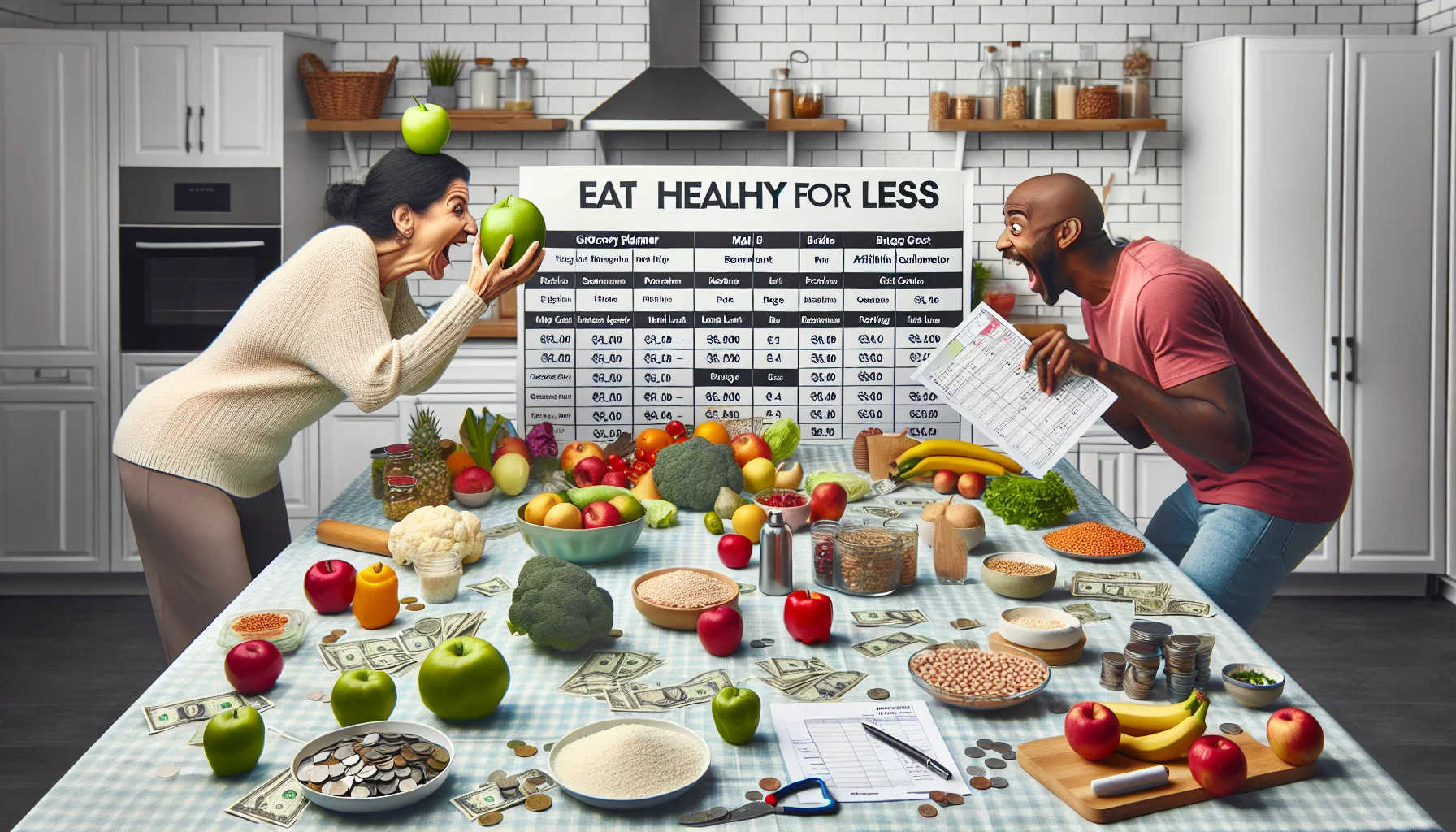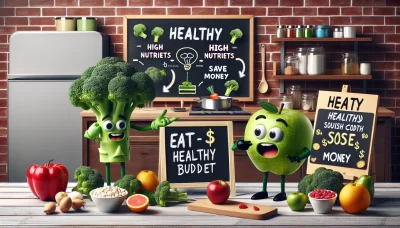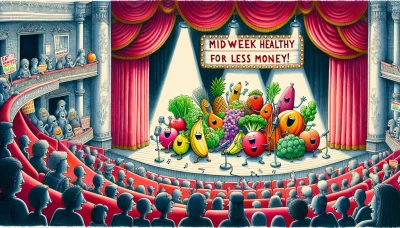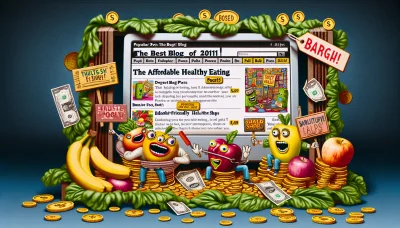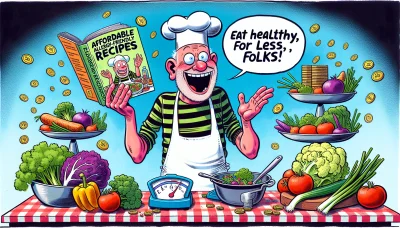Essential Grocery Budgeting Tools Quiz
Test Your Knowledge
Question of
Essential Grocery Budgeting Tools for Healthy Eating
Maintaining a healthy diet can often seem challenging, especially when trying to keep within a budget. However, with the right tools and strategies, it is entirely possible to eat healthily without breaking the bank. Budgeting for groceries is crucial as it helps in planning and purchasing nutritious foods within one's financial limits. By prioritizing expenses and making informed choices, individuals can enjoy a variety of healthy meals that support their wellbeing and lifestyle goals. Effective grocery budgeting not only fosters better eating habits but also ensures that every dollar is spent wisely towards promoting overall health.
Why Budgeting for Groceries Matters
Budgeting for groceries is an essential aspect of managing household finances that often goes overlooked. It is not just about saving money; it's about making informed choices that impact both your health and financial well-being. By setting a grocery budget, individuals can gain control over their spending, avoid impulse purchases, and prioritize their nutritional needs.
From a health perspective, budgeting for groceries allows individuals to plan meals more effectively. This planning can lead to healthier eating habits as it encourages the purchase of fresh produce, lean proteins, and whole grains over processed foods, which are often more expensive and less nutritious. By allocating a specific portion of their budget to groceries, people can ensure they are investing in their health by choosing quality ingredients that contribute to a balanced diet.
Financially, grocery budgeting can lead to significant savings. Food expenses are among the largest for many households, but by setting a budget, individuals can track their spending more closely, identify areas where they can cut back, and ultimately save money. This might involve taking advantage of sales, buying in bulk, or choosing generic brands over name brands. Furthermore, by reducing food waste through better meal planning and shopping habits, households can get the most out of their grocery budget, contributing to overall financial health.
In conclusion, budgeting for groceries is a crucial practice that benefits both health and finances. It fosters a mindful approach to eating and spending, encouraging healthier eating habits and financial savings. By taking the time to plan and budget for groceries, individuals can make a positive impact on their overall quality of life.
Top 5 Essential Grocery Budgeting Tools
- Mint: This app not only helps with overall budgeting but also offers features for tracking grocery spending. You can set specific budgets for your grocery expenses and monitor your progress in real time, encouraging healthier eating by allocating funds to nutritious foods.
- YNAB (You Need A Budget): YNAB is excellent for those looking to get granular with their grocery budgeting. It encourages users to give every dollar a job, including dollars spent on groceries, which can be focused towards healthier eating habits.
- Ibotta: Ibotta offers cash back on grocery purchases, including fresh fruits and vegetables. By using this app, you can save money on healthy food options, making it easier to stick to your grocery budget while prioritizing nutrition.
- Mealime: Mealime helps with meal planning and includes a grocery list feature that makes it easy to stick to your budget. It focuses on healthy recipes, and you can customize your meal plans based on dietary preferences, ensuring you buy what you need for nutritious meals without overspending.
- Flipp: Flipp aggregates weekly grocery flyers from various stores, allowing you to find the best deals on healthy foods. You can plan your shopping list based on what's on sale, helping you stay within budget while purchasing wholesome ingredients.
How to Use Grocery Budgeting Tools Effectively
Mastering the art of grocery budgeting is a crucial step towards maintaining a healthy diet without overspending. With the right strategies and the use of effective grocery budgeting tools, you can ensure that you're not only eating healthily but also getting the most value out of every dollar spent. Here are some tips to help you maximize the benefits of these tools.
Firstly, start by setting a clear budget. Before you even step foot in a grocery store or start filling up your online shopping cart, know exactly how much you can afford to spend. Use budgeting tools to help you track your spending and stay within your limits. This will help you avoid impulse buys that can quickly add up.
Next, plan your meals in advance. By knowing what you're going to eat throughout the week, you can make a precise shopping list that only includes the necessary ingredients. This not only saves time but also reduces waste and ensures that you're sticking to your healthy eating plan. Many grocery budgeting tools offer features that can help you plan your meals and generate shopping lists automatically.
Another effective strategy is to track prices and discounts. Use your grocery budgeting tool to monitor the prices of your regular purchases and take note of any patterns. Many stores have sales cycles, and if you can figure out when your favorite items are likely to be discounted, you can plan your purchases accordingly and save money.
Don't forget to make use of coupons and cashback offers. Many budgeting tools are integrated with databases of coupons and offers that you can apply to your grocery purchases. Spending a little time searching for relevant deals can lead to substantial savings over time.
Lastly, review your spending regularly. Take advantage of the reporting features in your grocery budgeting tool to see where your money is going. This can help you identify areas where you might be overspending and adjust your habits accordingly. Regular review sessions can also help you stay motivated and committed to your healthy eating and budgeting goals.
By incorporating these strategies into your routine, you'll find that managing your grocery budget becomes easier and more effective. Remember, the goal is to make healthy eating affordable and sustainable, and with the right tools and approach, you can achieve just that.
Planning Healthy Meals on a Budget
- Start with a meal plan: Decide what you will eat for each meal throughout the week.
- Make a grocery list: List all the ingredients you need for your meals to avoid impulse buys.
- Shop sales and use coupons: Take advantage of discounts and deals at your local grocery stores.
- Buy in bulk: Purchase non-perishable items or freezable goods in larger quantities for a lower price per unit.
- Choose whole foods: Opt for whole fruits and vegetables, grains, and lean proteins, which are often cheaper and healthier than processed foods.
- Prepare meals at home: Cooking at home is generally less expensive and healthier than eating out.
- Use leftovers creatively: Turn leftovers into new meals to reduce waste and save money.
- Grow your own vegetables: Even a small garden can save money on fresh produce during the growing season.
Saving Money with Seasonal and Local Produce
Buying seasonal and local produce offers a multitude of benefits that extend beyond just saving money. It's a practice that not only supports the local economy but also promises fresher, more nutritious options for your table. When you choose to buy what's in season in your area, you're often rewarded with lower prices. This is because the cost of transportation and storage is significantly reduced, and the abundance of the produce lowers its market price.
From a health perspective, seasonal fruits and vegetables are picked at the peak of their freshness, ensuring that they are packed with vitamins, minerals, and antioxidants. This is in contrast to out-of-season produce that may have been harvested early and then refrigerated for long periods, potentially diminishing its nutritional value. Moreover, local produce, by virtue of its short journey from farm to table, retains more of its nutritional quality compared to items that have traveled long distances.
Furthermore, buying local and seasonal produce encourages a more sustainable lifestyle. It reduces the carbon footprint associated with long-distance food transport and supports farming practices that are more likely to be sustainable. This not only contributes to the health of the planet but also promotes biodiversity by encouraging the cultivation of a wider variety of crops.
In conclusion, making the choice to buy seasonal and local produce is a win-win situation. It not only helps in saving money but also offers health benefits, supports local economies, and promotes sustainability. Next time you're at the grocery store or farmers market, consider choosing seasonal and local options to enjoy these myriad benefits.
Real-Life Success Stories
| Person's Name | Tool Used | Savings Achieved | Health Benefits Observed |
|---|---|---|---|
| Emily Johnson | Budget Bytes | $150/month | Weight loss, improved digestion |
| Michael Chen | Mealime | $200/month | Lowered blood pressure, increased energy |
| Sofia Martinez | Yummly | $100/month | Improved skin health, better sleep |
| Alex Dupont | Paprika | $250/month | Weight loss, enhanced mood |
